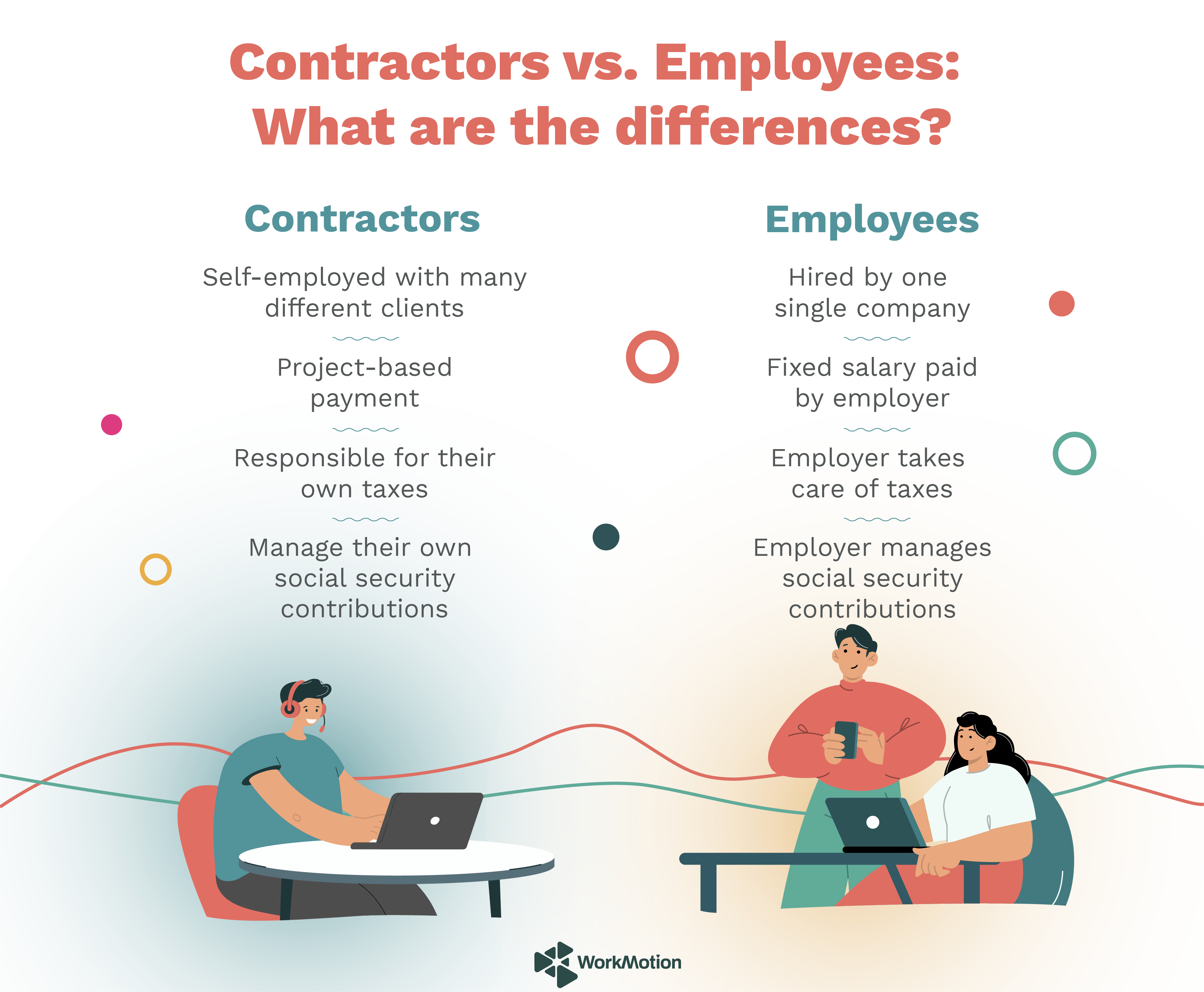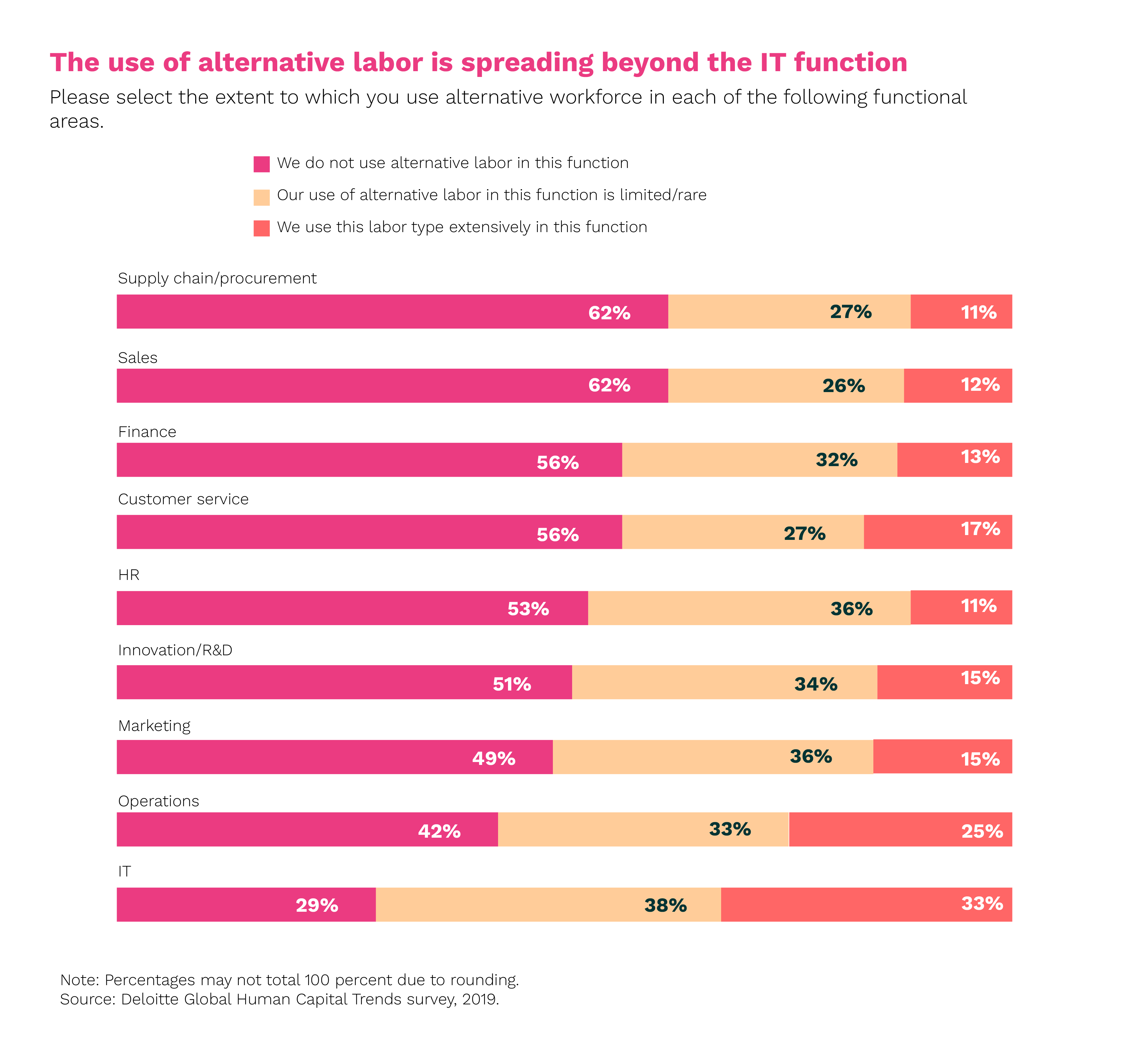Freelancer VS Employee: What’s Best For Your Company?
Date
Reading Time

The remote work environment has undergone an important development and changes in the past year. This has made it easier for employers and HR managers around the world to look for their workforce from a larger and more global talent pool.
Not only that but it has also facilitated companies to save costs of incorporating and managing local employees by instead relying on alternative labor, it being freelancers, contractors and gig workers.
They are quickly available, they quickly bring the needed skills and they quickly minimise the burden on busy HR departments. But even though they do everything “quickly”, contractors or freelancers don’t provide the stability or continuity required for steady growth.
So, is a team of freelancers what your company really needs?
Alternative Workforce
A recent study by Deloitte showed how much companies are relying on alternative labour.
However, the hiring of such alternative workforce does also bring some serious headaches for your company.
Talent misclassification is one of the greater issues when it comes to hire a freelancer. Tests used in misclassifications are rather similar all over the world.
Some of the factors used in determining misclassification are:
- Does the freelancer use the company’s materials/equipment?
- Does the freelancer have additional benefits such as holiday and sick pay?
- Where is the freelancer’s workplace?
- Does the freelancer take direction from a supervisor?
- How much control does the freelancer have?
If a misclassification is detected, employers are required to face a series of penalties and costs. These include:
- Paying back wages.
- Pay back all unpaid employment taxes and unpaid contributions.
- Pay back all statutory entitlements such as holiday pay, sick pay, etc.
- Employers might be charged penalties for not operating compliantly.
- Interests are also expected to be paid by the employer on the costs that are accrued.
When making use of a freelance or a contractor model other issues may further arise.
An important aspect would be the warding of intellectual property when building out a contract for a freelancer.
The copyright law states that the rights to any content are held by the creator, so that the freelancer will need to refrain from this right in a written contract before the work is handed over and considered property of the company the freelancer is working for.
Non-compete or non-disclosure clauses can also be hard to enforce since just asking a freelancer to sign such a clause may convince compliance regulators that this person is not a contractor but an employee.
Further difficulties
Since freelancers are not invested in the ongoing success of your company nor are they immersed in its culture, the level of motivation and engagement of gig worker will strongly depend on the financial reward or on the level of excitement of the project to fully commit to it.
Hiring a freelancer is also time consuming since it will involve several steps starting from posting the project on a freelance-marketplace to the negotiation of the budget and deadlines, only for only a specific task or project.
There’s still a place for freelancers
Of course, we’re not arguing that freelancers are never a useful choice. They can be a quick, uncomplicated resource for projects that are time-critical or require a unique skill. And, the nature of the business arrangement enables both parties to end a relationship quickly and easily, without the risks of terminating an employee.
Freelancers are still very much in demand, particularly in technology. According to a study by Hays, a global recruiting firm, four out of five companies currently use IT freelancers. That high number reflects an increasingly competitive technology job market, with multiple companies competing for the same local developer talent.
The tight market compels many companies to seek remote freelance developer teams in far-flung locations, from India to Russia. Often, these relationships entail risks in areas such as IP rights and misrepresentation.
Building a global team of permanent employees
Developing a cohesive workforce and maintaining a healthy corporate culture for the long-term requires committed employees, rather than an ever-changing roster of freelancers. Building a top-level team requires dissolving borders, and selecting the best talent from around the world.
There are three primary approaches to creating a truly global, clearly exceptional team:
Option 1: Set up an office in the countries potential employees live
You’ll need to work with a local labor lawyer to understand the country’s legal requirements, and a local tax professional to determine the right legal form for the new entity.
You must offer the required employee benefits, negotiate health insurance, and set up any mandated pension funding.
Payroll systems must be in place before the first employee begins work, and monthly payroll must be processed in full compliance with the law.
If an employee is terminated, you’ll need to understand local laws in order to avoid costly litigation. You’ll need to repeat these processes from each country in which you hire workers.
Option 2: Hire freelancers with fixed, long-term contracts
You’ll need to determine under which country’s laws the contract will be created.
Begin by consulting a lawyer who is familiar with applicable laws in your country and the freelancer’s country.
European law provides for a degree of flexibility among EU countries, but individual countries still have authority.
Outside of Europe, laws vary wildly from one country to the next. Again, you’ll need a local lawyer from each country in which you want to hire.
Work with an Employer of Record (EoR) service
So, is this all? Does this mean that the best way to go is to just give up on many of the benefits that freelancers bring and stick to a hire-locally approach? Not quite, there is a third option that will help you get “the best of both worlds”.
An Employer of Record service acts as an intermediary, working between the employee in another country, and your company.
The employee technically works for the EoR service, but remains under the authority of the hiring company.
The EoR serves as the HR manager, and takes care of employment contracts, benefits, social security contributions, insurance, payroll, and much more. A robust EoR service, like WorkMotion, can offer services in an expansive range of countries.
The WorkMotion-difference
Sustainable growth requires a motivated team of permanent employees. As a truly global, deeply knowledgeable Employer of Record service, WorkMotion is uniquely positioned to help companies fuel their growth, powered by the best talent from around the world.
WorkMotion offers:
– The local expertise and technical know-how to onboard and manage employees in over 160+ countries.
– Clearly defined contractual provisions to ensure compliance with local and international labour laws and help avoid intellectual property issues.
– Comprehensive administration of all aspects of employee management, including onboarding, payroll, benefits, and more.
– A robust HR platform that provides a structured overview of all employee activity and expenses, and generates a single, consolidated invoice for the employee.
While a freelance workforce is convenient, it’s not a solid foundation for sustainable growth. An EoR service like WorkMotion can fuel your global growth, without the complexities of global hiring. Sounds good? Contact us!
Latest articles

Overcoming talent shortage in Germany with global hiring

10 awesome remote work rituals you should implement in 2024



